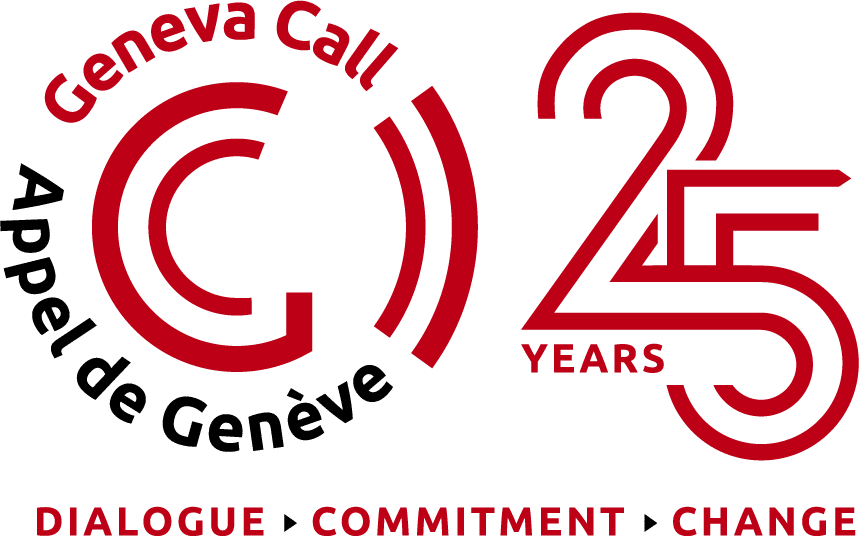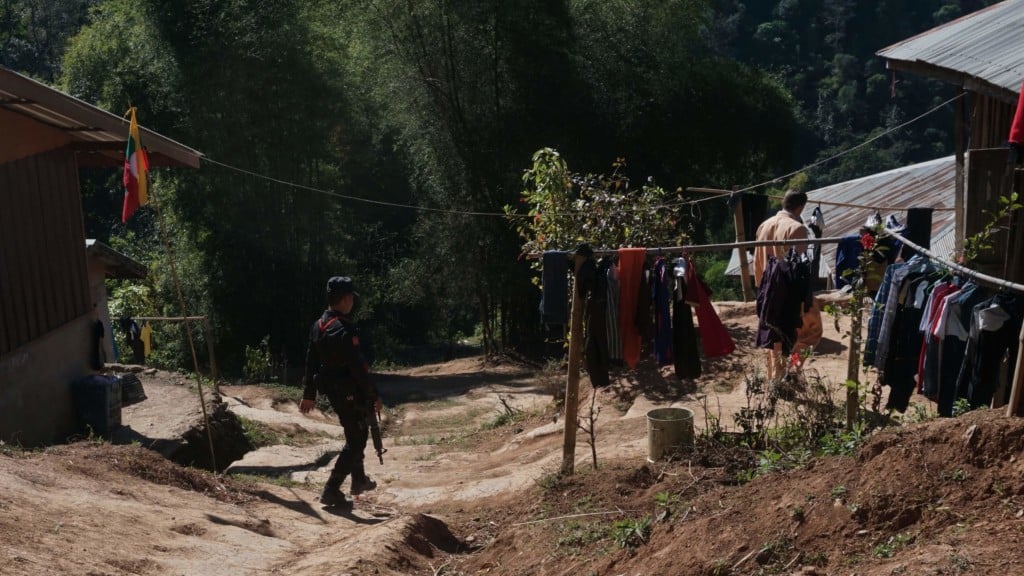
Humanitarian Access in Armed Conflicts: Main Takeaways
31 July 2021
Also available in Russian, Ukrainian, Dari and Pashto.
Humanitarian assistance is essential to save lives, alleviate suffering and preserve human dignity during armed conflicts and other crises. It focuses on providing material aid (e.g., food, water, clothes) and facilitating logistics aid to people in need (e.g., providing shelters, safe transportation). Unfortunately, denials and barriers to humanitarian assistance by fighting parties has become a recurrent trend in modern armed conflicts across the globe in Asia, Africa, Europe, Middle East and Latin America.
History has also witnessed these contemporary obstacles through impediments to humanitarian assistance and jeopardised safety of relief personnel in Bosnia and Herzegovina, as well as administrative roadblocks and direct attacks in Kosovo. Barriers were likewise faced by humanitarian actors due to changing policies and regulations and administrative measures that hindered adequate access to vulnerable populations in Myanmar. In addition, the prevalence of political interest and conflict dynamics has obstructed free movement of humanitarian operations in certain contexts where direct attacks and other security challenges are a risk for humanitarian workers.
This issue is exacerbated by [su_tooltip text=”According to the Food and Agriculture Organization of the United Nations (FAO) “a person is food insecure when they lack regular access to enough safe and nutritious food for normal growth and development and an active and healthy life.””]food insecurity[/su_tooltip] and displacement in times of armed conflict, thus demanding more humanitarian assistance in order to meet conflict-affected population’s needs.

Knowing this information makes us question ourselves: What does International Law say about humanitarian assistance during armed conflicts?
In fact, [su_tooltip text=”It is a set of international rules that aims at limiting the effect of armed conflict. It protects those who are not or are no longer participating in hostilities and regulates the means and methods of warfare. The main rules of IHL are enshrined in the four Geneva Conventions of 1949 and their Additional Protocols and in Customary IHL.”]International Humanitarian Law[/su_tooltip] (known as the Law of War – IHL) sets out a clear legal framework governing humanitarian assistance which will be explored in today’s short session.
It is important that we go through the main aspects concerning the protection of humanitarian assistance under IHL:
- A fighting party that exercises control over certain territories has the responsibility to provide for the concerned population’s needs, if those needs are not met by the territorial state.
- IHL sets out the principles governing the delivery of humanitarian assistance.
- IHL establishes the obligation to allow humanitarian assistance when the civilian population is at risk of starvation.
However, the provision of humanitarian assistance is also protected by [su_tooltip text=”It is a set of international norms that aims at protecting individuals both in peacetime and in situations of armed conflict. IHRL is composed of several international treaties originated from the Universal Declaration of Human Rights. “]International Human Rights Law[/su_tooltip] (IHRL). The complementary nature of IHL and IHRL during armed conflicts is reflected in preserving the right to food and this entails an obligation to not obstruct access to humanitarian aid.
What is the role of impartial humanitarian organisations?
Humanitarian organisations may offer their services to the parties to the conflict, including to deliver humanitarian assistance. This offer is known as the right of humanitarian initiative which is reserved for organisations conducting their activities based on the cornerstone principles of humanity, neutrality, independence and impartiality.
The principles of [su_tooltip text=”Humanitarian actors shall not take sides in hostilities. Not guided by political, racial, religious, or ideological considerations.”]neutrality[/su_tooltip] and [su_tooltip text=”Autonomous from political, economic and military or other objectives held by any actor. Not subordinated to the objectives of fighting parties.”]independence[/su_tooltip] highlight the importance of not taking sides in hostilities and operating autonomously from any political or military interest held by fighting parties and influencing actors. The principles of [su_tooltip text=”Human suffering shall be addressed wherever it is found. Protects life, dignity and health by ensuring respect for human beings.”]humanity[/su_tooltip] and [su_tooltip text=”Guided on the basis of need alone. Gives priority to the most urgent cases without making distinctions based on nationality, race, gender, religion, or political opinion.”]impartiality[/su_tooltip] require that priority to grant humanitarian assistance can only be based on the needs of the population and cannot discriminate on grounds such as race, colour, religion or faith, sex, birth, and class among other. As long as it abides by these underpinning principles, providing humanitarian assistance can never be seen as an intervention in internal affairs nor siding with one of the parties to the conflict.

In addition to the law, it is important to emphasise the crucial role that humanitarian organisations play in securing acceptance by concerned communities to deliver humanitarian assistance. Communities may influence fighting parties to provide safe access to humanitarian relief personnel and supervise the effective delivery of aid in good faith.
When and why should fighting parties give consent?
Under IHL, the delivery of humanitarian aid is possible when concerned fighting parties give their consent. However, that right of consent is not absolute and cannot be exercised arbitrarily.
Withholding consent would be arbitrary in case such a measure was not necessary (there are no other alternatives available, but as other alternatives become available the reason to deny access may disappear) or proportionate (interference and consequences of denial of access must be considered at all times). For example, arbitrary denial would occur when denial results in starvation of the civilian population, which is a violation under international law.
Thus, denying consent needs specify the duration, location, and services that must be restricted due to a valid reason. Similarly, imposed constraints should not be unreasonable, unpredictable or inappropriate.
Consultations with stakeholders conducted by Geneva Call have revealed that, apart from security grounds, fighting parties base their consent refusal on the disregard for humanitarian principles by actors offering relief. Misperceptions about humanitarian workers operating in violation of the humanitarian principles fuel a hostile attitude towards relief operations and increase oversight. For instance, the lack of trust and impression of partiality can be caused by the absence of consultations, aiming to overlook concerned fighting parties and their role on the ground.
Now you may ask yourselves: Why should fighting parties give consent?
- First, it offers them an avenue to meet their legal obligations through assisting the population they aspire to represent.
- Second, as local authorities work in partnership with fighting parties in many contexts, there is a desire and willingness of fighting parties to be seen as ‘team players’ when addressing and overcoming conflict and other crises by allowing humanitarian assistance.
Negotiations on the respect of humanitarian norms, which entail providing access to humanitarian assistance, can also play a big role in fostering further peace talks such as the 2009 Agreement between Moro Islamic Liberation Front and the government of the Philippines.
What role do fighting parties play after consent is given?
- They have an obligation to allow and facilitate the rapid and unimpeded passage of humanitarian assistance, as well as to ensure the freedom of movement of [su_tooltip text=”Personnel involved in humanitarian relief operations.”]relief personnel[/su_tooltip].
- In order to successfully achieve the above, fighting parties need to tailor administrative measures (entry procedures and certification among others).
They must respect and protect humanitarian activities to enable effective humanitarian operations by ensuring the security of humanitarian personnel and protecting relief objects from being destroyed or looted.
In addition, fighting parties can impose certain measures of control on humanitarian assistance including the verification of the exclusively humanitarian nature of assistance, designation of delivery routes, as well as impose health and safety standards.
These measures of control can never be used to impede the delivery of assistance, undermine humanitarian principles that guide humanitarian action, or jeopardise the population’s security and safety. If they do, their practical effect can have the same impact as arbitrarily withholding consent and risks conflating the right to consent with the right to impose measures of control.
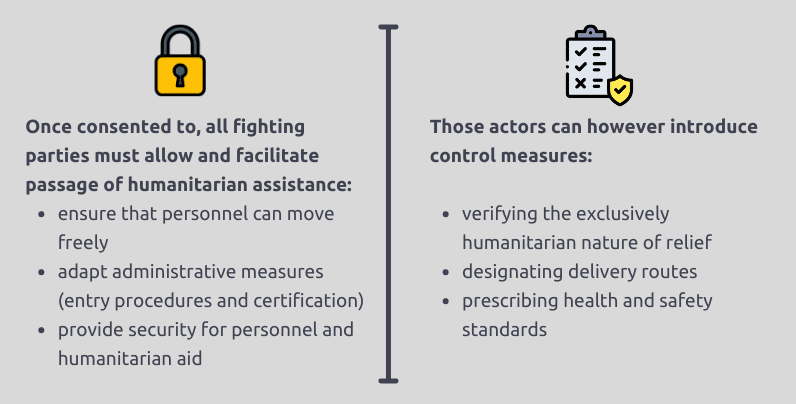
Wrap up remarks
Based on what we have explored during this session, it is important to highlight the main recommendations for fighting parties to facilitate/preserve humanitarian assistance and guarantee it reaches those most in need. These include:
- Avoid conflating the right to consent with the right to subject humanitarian relief to measures of control.
- Pursue measures of control in good faith and not use excessive administrative barriers to confine humanitarian activities.
- To the extent possible, protect humanitarian assistance by:
-
- coordinating with humanitarian personnel safe routes to access the population in need and deliver assistance;
- protecting relief personnel from the effects of weapons, including landmines, booby-traps and other explosive devices;
- protecting relief objects from misuse, looting and destruction.
-
- Respect and not undermine the humanitarian principles that guide the work of humanitarian organisations, namely humanity, neutrality, impartiality and independence.
- As a way to foster ownership over their duty to address civilians’ needs in times of armed conflict, take up commitments on:
-
-
- humanitarian assistance
- addressing food insecurity
- facilitating access to health and education
- demining activities
-
-
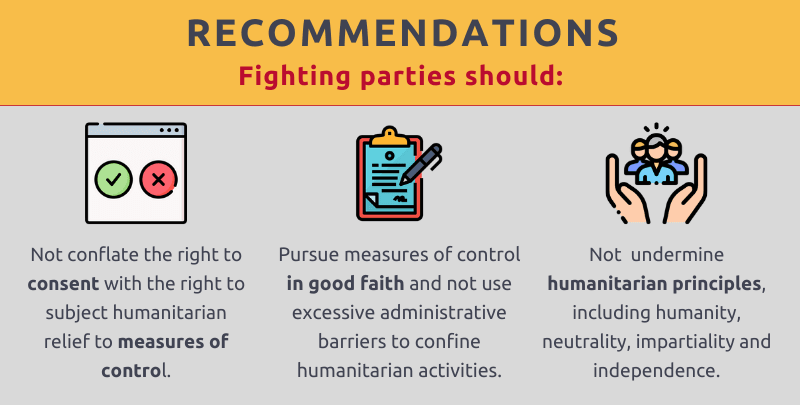
On the other hand, humanitarian organisations can adopt certain measures to preserve their mandates, activities and staff, including:
- Uphold humanitarian principles by endeavouring to address the needs of civilians in territories controlled by fighting parties
- Build trust and acceptance from concerned communities and act in a transparent manner, in line with the principles of humanity and impartiality
- Conduct long-term, consistent and proactive humanitarian engagement with concerned fighting parties to ensure consent
- Ensure humanitarian assistance programs are implemented through a [su_tooltip text=”Conflict sensitivity recognises that aid, whether development, peacebuilding, or humanitarian assistance, has the potential to support either conflict or peace. Practicing conflict sensitivity refers to the ability of an organisation to: understand the context in which it is operating, particularly intergroup relations; understand the interactions between its interventions and the context/group relations; and act upon the understanding of these interactions, in order to avoid negative impacts and maximise positive impacts. It required that all organisations and actors consider the unintended consequences of their programmes on the relationship between groups of people in the context, and act to address those consequences. “]conflict-sensitive[/su_tooltip] lens.
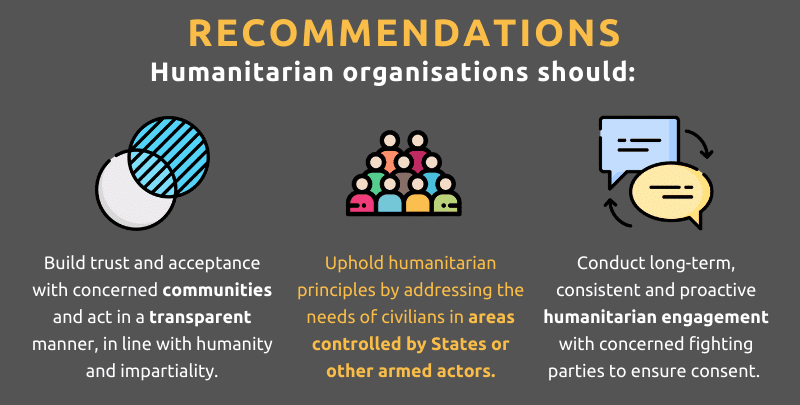
Authors: Mina Radoncic (Geneva Call Associate) and Ximena Galvez ( Eurasia Regional Legal and Policy Coordinator).
